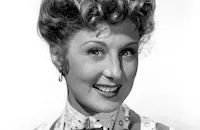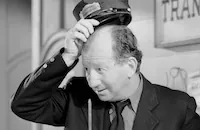Big City

Brief Synopsis
Cast & Crew
Norman Taurog
Margaret O'brien
Robert Preston
Danny Thomas
George Murphy
Karin Booth
Film Details
Technical Specs

Synopsis
One day, in New York City's East Side, cantor David Irwin Feldman rescues an abandoned infant girl he has found on an apartment building stoop. After caring for the girl for a few days, David and his friends, Phillip Y. Andrews, a Protestant minister, and Patrick O'Donnell, an Irish American Catholic police officer, decide to adopt the girl jointly. Judge Martin O. Abercrombie consents to the adoption in the hopes that it will bring together the East Side Jewish, Protestant and Catholic communities. As part of the agreement, however, the judge stipulates that the first of the three men to marry shall become the sole and permanent foster father. After naming the girl Midge, the three bachelors take up the responsibility of rearing the girl. Time passes, and Midge, now a grade school student, suffers the taunts of her schoolmates when she tries to explain her "family" situation. When one of Midge's classmates, Lewis Keller, pelts her with a tomato, Midge loses her confidence and tells Phillip that she is ashamed that she has no mother. Later, Midge's teacher, Florence Bartlett, tells Phillip that she is opposed to their parenting "experiment" because it makes Midge "different" and mixes Midge up in three different faiths. Phillip, however, argues that the three faiths have a "common denominator," and that Midge is learning manners from Pat and singing from David. Realizing that he has not convinced Florence of the success he, Pat and David have had in rearing Midge, Phillip invites Florence to visit their home and see the results for herself. Phillip's plan works, and Midge changes her opinion about the unconventional family. While David falls in love with Florence, Pat begins courting "Shoo-Shoo" Grady, a street-smart singer at Bernie's Bar. Midge and Shoo-Shoo become fast friends, but their friendship is soon questioned by David when he sees Midge imitating the singer's sultry style. While David and Phillip prohibit Midge from spending time with Shoo-Shoo, Pat makes an unsuccessful attempt to persuade them that the singer is actually a good influence. Pat and Shoo-Shoo secretly marry, but soon after Shoo-Shoo learns of David and Phillip's decision, she leaves town. An outraged Pat takes his case to court, but Phillip and David refuse to give up custody of Midge without a fight. When Judge Abercrombie asks Midge to decide her fate, the girl says that she loves all three men and believes the only way to resolve the dispute is to put herself in the custody of an orphanage. Abercrombie agrees with Midge's suggestion, but the decision is protested by all three foster fathers, who tell the judge that they are willing to relinquish custody rather than see Midge sent to an orphanage. Realizing that the three men, Florence and Shoo-Shoo all love Midge, Abercrombie decides to return Midge to them and discard the stipulation he made about marriage.

Director

Norman Taurog
Cast

Margaret O'brien

Robert Preston
Danny Thomas

George Murphy
Karin Booth

Edward Arnold

Butch Jenkins

Betty Garrett
Lotte Lehmann
Page Cavanaugh Trio

Connie Gilchrist
Marles Noie
Peter Roman
Brick Sullivan
Jack Worth

Hank Mann
Heinie Conklin
Ben Moselle
Bobby Barber
Sailor Vincent
Clarence Hennecke
Charles Sullivan
Stanley Blystone
David Leonard
Lotte Stein
Arthur Walsh
Joy Ames
George Davis
Skeets Noyes
Patricia Vaniver
Maynard Holmes
Wilson Wood
Doris Kemper
Jerry Mickelsen
David Bair
Frank Mayo
Colin Kenny
Sherry Hall
Irene Seidner
George Calliga
Robert Emmett Keane

Donald Gordon
Crew
Preston Ames
Leo Arnaud
Irving Berlin
Johannes Brahms
Anne Morrison Chapin
Whitfield Cook
Jack Dawn
Frankie Day
Stanley Donen
Dorothy Fields
Cedric Gibbons
Sydney Guilaroff
Inez James
Aben Kandel
Nanette Kutner
Miklos Laszlo
Jimmy Mchugh
Sidney Miller
James Lyman Molloy
Marsha Norman
Joe Pasternak
Walter Popp
Charles Prescott
Helen Rose
Gene Ruggiero
Charles Schrouder
Jerry Seelen
Douglas Shearer
Sid Sidman
Alfred E. Spencer
Fred Spielman
Georgie Stoll
Robert Surtees
Janice Torre
Edwin B. Willis

Videos
Movie Clip



Film Details
Technical Specs

Articles
Big City (1948)
Producer: Joe Pasternak
Director: Norman Taurog
Screenplay: Ann Morrison, Chapin Whitfield Cook (writer); Miklós László (story); Nanette Kutner (adaptation); Aben Kandel (additional dialogue)
Cinematography: Robert Surtees
Art Direction: Preston Ames, Cedric Gibbons
Music: Lothar Perl, Albert Sendrey, George Stoll (all uncredited)
Film Editing: Gene Ruggiero
Cast: Margaret O'Brien (Midge), Robert Preston (Rev. Philip Y. Andrews), Danny Thomas (Cantor David Irwin Feldman), George Murphy (Patrick O'Donnell), Karin Booth (Florence Bartlett), Edward Arnold (Judge Martin O. Abercrombie), Butch Jenkins (Louis Keller), Betty Garrett (Shoo Shoo Grady), Lotte Lehmann (Mama Feldman), Connie Gilchrist (Martha, the Judge's Maid).
BW-103m.

Big City (1948)
Quotes
Trivia
Notes
Working titles of the film included Catherine (Unfinished Symphany), Brothers of the East Side and Home Is Where the Heart Is. July 1947 Hollywood Reporter news items indicate that producer Joe Pasternak purchased the rights to Miklos Laszlo's story in 1937. Information in the file on the film in the M-G-M Script Collection at the AMPAS library indicates that the initial script was based on a story, or possibly an unpublished novel, by Laszlo entitled "Catherine (Unfinished Sympathy)." Script materials also indicate that in 1942, "Brothers of the East Side," the title of Nanette Kutner's treatment, was submitted, based on an idea by Pasternak. Several treatments and outlines were written over the course of the next four years, variously titled "Brothers of the East Side," "Catherine" and "Home Is Where the Heart Is." Additional writers who worked on these treatments included Charles Larson and Warner Law, but the extent of their contributions to the completed film has not been determined.
A February 1947 Hollywood Reporter news item noted that actor Van Heflin was "pencilled in" for the part played by Robert Preston. A July 1947 news item indicated that M-G-M writer Leslie Kardos was set to make his directorial debut with this film. The picture marked the screen debut of Broadway actress Betty Garrett and opera star Lotte Lehmann. Although a November 1947 M-G-M News item noted that former Keystone Kop players Hank Mann and Heinie Conklin appear in the film as police officers, they actually played "drunks." According to a 1953 Hollywood Citizen-News article, writer Walter Abbott received a "very good settlement" from M-G-M following his $100,000 plagiarism suit against the company. Abbott claimed in the suit that the studio based Big City on his story entitled "Choir Boy."














